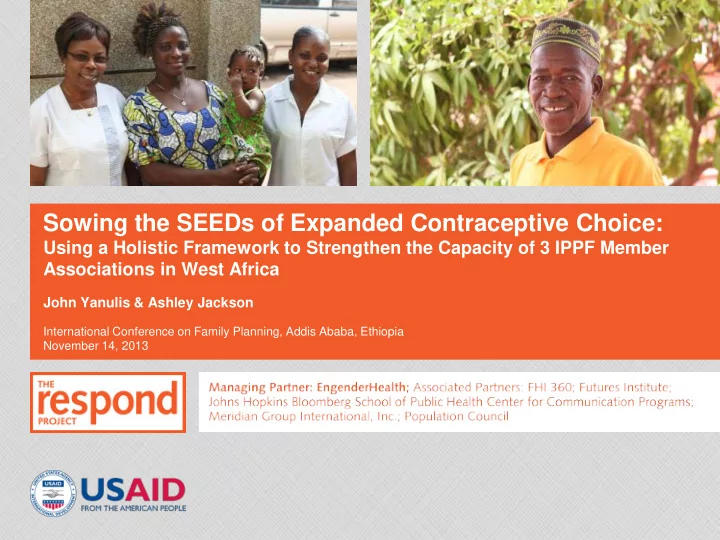

Sowing the SEEDs of Expanded Contraceptive Choice: Using a Holistic Framework to Strengthen the Capacity of 3 IPPF Member Associations in West Africa John Yanulis & Ashley Jackson International Conference on Family Planning, Addis Ababa, Ethiopia November 14, 2013
Overview Context SEED Model for Family Planning (FP) Programming Collaboration with the International Planned Parenthood Federation (IPPF) Documentation methodology Results Lessons learned
International Planned Parenthood Federation
Context: Vast Unmet Need for FP Met and unmet need for family planning among women in union 50% 45% Percentage of women in union 40% 35% 30% 31% 24% 25% 30% 20% 15% 10% 15% 13% 5% 8% 0% Benin Burkina Faso Togo LA methods Other modern methods Unmet need
EngenderHealth’s SEED Model for FP Programming
RESPOND’s Work with IPPF Member Associations May 2011–April 2013 – Organizational Capacity Self-Assessments (x2) – Regional meeting: SEED Model, action planning – Provider trainings: FP counseling, clinical FP, facilitative supervision – Small grants to implement holistic action plans – Regional meeting to share experiences
Documentation Methodology Brief visits to each country to collect service statistics and interview key informants Type of key informant Number interviewed Management staff 12 Providers 14 Champions 3 Clients 16 Total 45 Participation in regional meeting to share experiences
Results: Service Statistics Increase in Couple Years of Protection (CYP) for ABPF in Benin Couple-Years of Protection provided by method, ABPF (Benin) 50000 45000 40000 35000 IUD 30000 CYP Implant 25000 Injectable 20000 15000 Pill 10000 5000 0 2011 (pre) 2012 (post)
Results: Service Statistics Increase in CYP for ABBEF in Burkina Faso Couple-Years of Protection provided by method, ABBEF (Burkina Faso) 25000 20000 IUD 15000 CYP Implant Injectable 10000 Pill 5000 0 2011 2012
Results: Service Statistics Increase in CYP for ATBEF in Togo Couple-Years of Protection provided by method, ATBEF (Togo) 20000 18000 16000 14000 IUD 12000 CYP Implant 10000 Injectable 8000 6000 Pill 4000 2000 0 2011 2012
Results: Supply Benin Burkina Togo Total (18 trips) (112 trips) (61 trips) Clients served 419 2,868 1,339 4,626 through mobile services Methods chosen by mobile service clients 8% 17% Pill Injectable Implant IUD 18% 57%
Results: Enabling Environment and Demand Outreach to men Champions: religious and traditional leaders, clients, peer educators FP talks on the radio and at a university TV spots IEC/BCC materials Couple communication films at clinics
Lessons Learned Self-assessments and SEED helped MAs identify and address gaps All 3 MAs adopted SEED as their framework for FP programming – All 3 won proposals based on SEED – Collectively leveraged more than $2 million – MAs are continuing successful strategies they initiated under this activity Need for additional capacity building on how to conduct activities to improve the environment and increase demand Regional exchange of experiences was highly valued by MAs
www.respond-project.org Photo credits: A. Jackson/EngenderHealth
Recommend
More recommend